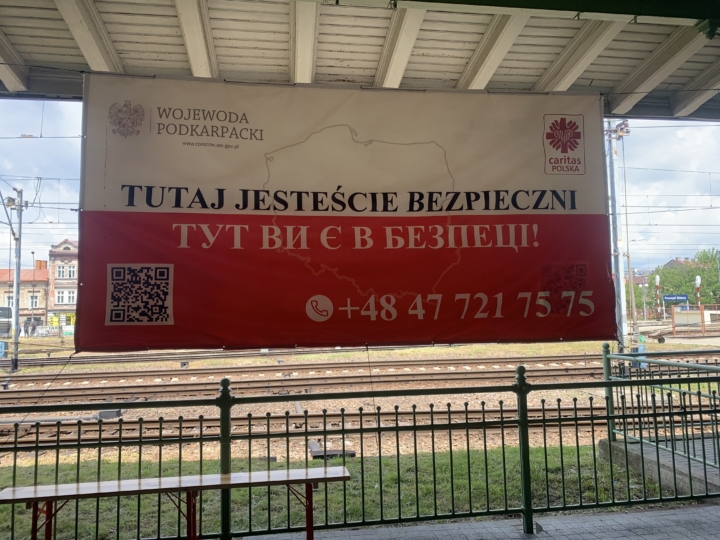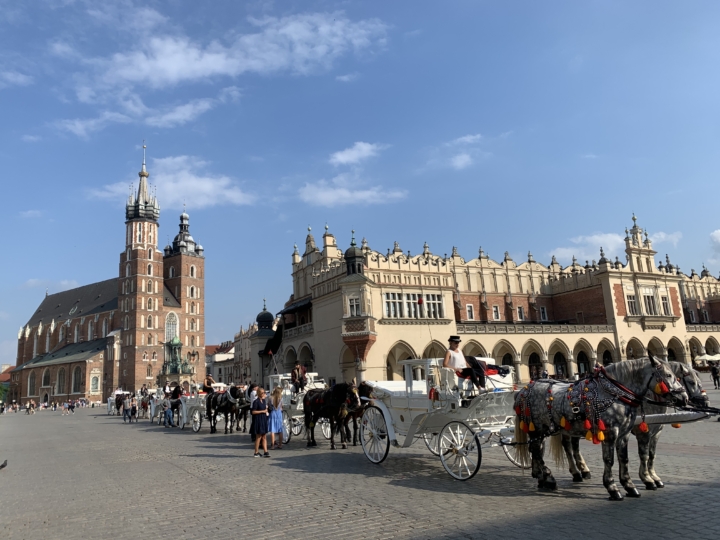Ola Pozor ’19 has visited her family in Poland almost every year since she was a child, but there was something drastically different about her most recent trip there in June.
Pozor, an undergraduate admission counselor at William & Mary, volunteered to help Ukrainian refugees in Kraków and Przemyśl, cities close to the borders of Slovakia and Ukraine that have seen significant movement of families and individuals fleeing from Ukraine since Russia invaded in February.

Pozor, the daughter of Polish immigrants, worked at distribution centers in both cities, helping unload trucks, sort donations and dispense essential items to those in need. In preparation for her trip, Pozor organized a GoFundMe online fundraising account where friends and associates, many from W&M, contributed donations to purchase supplies like bandages, razors and sanitary products.
“I brought a huge duffel bag of materials in bulk to distribute,” said Pozor, who has also donated money to various non-governmental organizations (NGOs). “In Poland, I worked with other volunteers on the ground from all over the world – Americans, Poles, Ukrainians and other Europeans – so it was really beautiful to see how many people from the outside kind of dropped everything to help.”
Most of Pozor’s family still lives in Poland, including grandparents who have experienced war and destruction during their lifetimes. Pozor was compelled to jump into action immediately after the Russian invasion began.
“I felt an absolute need to do something,” Pozor said. “Of all global crises that I’m hearing about, listening about and studying, this was one that really struck a heartstring in terms of shared historical trauma of Russian and outside invasion and occupation. Death and destruction is something that has affected my people for generations.”
Pozor says the community and belonging she experienced as a student at William & Mary “empowered me to facilitate community and belonging for those coming from the outside into a new setting, at both the university and on the Polish-Ukrainian border.” It’s also where she amassed many of her language skills through courses she took in Russian and post-Soviet studies.
“I have these skills, and I’m not just doing it to make myself feel better or do any sort of voluntourism. That’s not quite the way my ethical code goes,” said Pozor, who learned of volunteer and donation opportunities through social media communities.
“Also it’s that empathetic approach of if this would have happened to Poland, for instance, I know that I would have really appreciated the volunteer efforts of people from other countries and NGOs as well.”

Outpouring of support
Pozor recently shared her experiences from her trip to the university’s Project Global Officer (Project GO) students during a presentation at the Reves Center for International Studies.
“I hadn’t really learned a lot about collective trauma and the struggles that both Polish and Ukrainian and Baltic states face,” said Monica Sullivan ’24, a Russian and post-Soviet studies major who is participating in Project GO for the second straight year. “What she did there definitely made me want to go and volunteer there and learn more.”
Pozor is one of many in the William & Mary community who has donated time and money to assist those affected by Russia’s invasion of Ukraine, said Bella Ginzbursky-Blum, a senior lecturer of Russian studies and director of the W&M Russian Project GO program.
“I know that it’s not as much in the news as it was early on, but I am very grateful that our William & Mary community and our community of friends and family has actually been very active. It’s very gratifying,” Ginzbursky-Blum said.
Pozor and Ginzbursky-Blum were moved by the outpouring of support from their friends and associates at William & Mary when the war first started. Pozor said she had texts “flooding in” from friends asking if her family in Poland was safe.
Ginzbursky-Blum has close family in Kyiv, the Ukrainian capital, and she said she was “completely terrified and devastated” in the days after the invasion. She said her students responded with empathy and care when she expressed her concerns to them.
Later in the semester, two of Ginzbursky-Blum’s classes came together to offer more support to her and her family.
“They surprised me with a beautiful card,” she said. “Inside the card was a printout of a fundraiser they donated to on behalf of my family. I was incredibly touched.”
Pozor’s presentation to the Project GO students was powerful in communicating just how active the William & Mary community has been in its efforts to help, Ginzbursky-Blum said.
“It’s one thing to tell the students there are millions of Ukrainian refugees in Poland, but it’s a whole other thing to hear from a person on the ground and to hear specifically from an American young person who recently graduated, who took our Russian courses, who goes there and volunteers and sees these Ukrainian refugees and can come back and tell them, ‘Here’s what I saw,’” Ginzbursky-Blum said.

Empathetic, gracious approach
What Pozor saw was a Polish government working swiftly to help Ukrainian refugees in many ways.
“The Polish government has surprisingly and impressively offered the refugees sort of immediate refugee status for up to 18 months, even up to three years if they extend it, and they are offering temporary residence numbers and cards so that Ukrainian adults can pursue a job and sort of integrate into the workforce,” Pozor said.
“My overall impression is a very empathetic, gracious approach from the Polish people, NGOs especially.”
Pozor said she witnessed a wide spectrum of refugees entering Poland.
“There are those who come with their entire lives packed in many suitcases because they had the chance to get out before any immediate danger hit them, but then there were others who came without anything because everything had been destroyed and taken away from them,” Pozor said.
Pozor saw refugee children in the Przemyśl train station coloring and posting pictures of peace signs and flags. She witnessed protests and demonstrations by refugees in the main square of Krakow. She observed Polish signs advertising spare rooms or car rides to the displaced Ukrainians.
“Something that really positively impressed me was the access to resources,” Pozor said. “Everywhere I went there were posters and signs with phone numbers and Ukrainian flags very clearly directed towards those who needed assistance, and there were very comforting messages on posters saying, ‘You are safe here’ or ‘We are in solidarity with you.’”
Pozor has plans to help even more in the future, and she is assisting friends who are eager to donate their time, money and other items to the cause. For anybody who wants to help, she urges them to join social media communities to connect to organizations that are helping those displaced by the war.
“I’ve had a lot of emotional processing to do after this whole trip and trying to figure out what I want to do next,” Pozor said. “But certainly, I’ve been using my personal social media to tell folks about what organizations I saw on the ground and where they could donate.”
Nathan Warters, Assistant Director of Media Relations

